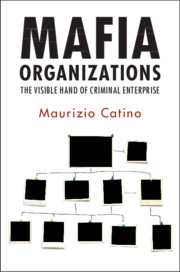Crossref Citations
This Book has been
cited by the following publications. This list is generated based on data provided by Crossref.
2019.
Publications Received.
Administrative Science Quarterly,
Vol. 64,
Issue. 3,
p.
770.
2019.
Publications Received.
Contemporary Sociology: A Journal of Reviews,
Vol. 48,
Issue. 4,
p.
481.
Smith, Chris M.
2020.
Exogenous Shocks, the Criminal Elite, and Increasing Gender Inequality in Chicago Organized Crime.
American Sociological Review,
Vol. 85,
Issue. 5,
p.
895.
2020.
Front Matter.
Crime and Justice,
Vol. 49,
Issue. ,
p.
i.
Catino, Maurizio
2020.
Italian Organized Crime since 1950.
Crime and Justice,
Vol. 49,
Issue. ,
p.
69.
Reuter, Peter
and
Paoli, Letizia
2020.
How Similar Are Modern Criminal Syndicates to Traditional Mafias?.
Crime and Justice,
Vol. 49,
Issue. ,
p.
223.
Paoli, Letizia
2020.
What Makes Mafias Different?.
Crime and Justice,
Vol. 49,
Issue. ,
p.
141.
Varese, Federico
2020.
How Mafias Migrate: Transplantation, Functional Diversification, and Separation.
Crime and Justice,
Vol. 49,
Issue. ,
p.
289.
Baradel, Martina
and
Bortolussi, Jacopo
2021.
Under a setting sun: the spatial displacement of the yakuza and their longing for visibility.
Trends in Organized Crime,
Vol. 24,
Issue. 2,
p.
209.
Andris, Clio
DellaPosta, Daniel
Freelin, Brittany N.
Zhu, Xi
Hinger, Bradley
and
Chen, Hanzhou
2021.
To racketeer among neighbors: spatial features of criminal collaboration in the American Mafia.
International Journal of Geographical Information Science,
Vol. 35,
Issue. 12,
p.
2463.
Thompson, Henry
2021.
Cosa Nostra Courts.
SSRN Electronic Journal ,
Sergi, Anna
and
Storti, Luca
2021.
Shaping space. A conceptual framework on the connections between organised crime groups and territories.
Trends in Organized Crime,
Vol. 24,
Issue. 2,
p.
137.
Varese, Federico
Lonsky, Jakub
and
Podvysotskiy, Yuriy
2021.
The Resilience of the Russian mafia: An Empirical Study.
The British Journal of Criminology,
Vol. 61,
Issue. 1,
p.
143.
Paus, Anna
2021.
Human smuggling at EU-internal transit points: strengths of a disorganised illegal market and how to effectively reduce it.
Global Crime,
Vol. 22,
Issue. 3,
p.
171.
Sergi, Anna
2021.
‘Ndrangheta Dynasties: A Conceptual and Operational Framework for the Cross-Border Policing of the Calabrian Mafia.
Policing: A Journal of Policy and Practice,
Vol. 15,
Issue. 2,
p.
1522.
Albanese, Jay S.
2021.
Organized Crime as Financial Crime: The Nature of Organized Crime as Reflected in Prosecutions and Research.
Victims & Offenders,
Vol. 16,
Issue. 3,
p.
431.
Holt, Amanda
2021.
Family Criminology.
p.
95.
Calderoni, Francesco
Campedelli, Gian Maria
Szekely, Aron
Paolucci, Mario
and
Andrighetto, Giulia
2022.
Recruitment into Organized Crime: An Agent-Based Approach Testing the Impact of Different Policies.
Journal of Quantitative Criminology,
Vol. 38,
Issue. 1,
p.
197.
Smith, Chris M.
and
Papachristos, Andrew V.
2022.
Violence brokers and super-spreaders: how organised crime transformed the structure of Chicago violence during Prohibition.
Global Crime,
Vol. 23,
Issue. 1,
p.
23.
Sergi, Anna
2022.
Mafia Borderland: Narratives, Traits, and Expectations of Italian-American Mafias in Ontario and the Niagara Region.
Journal of Borderlands Studies,
p.
1.





